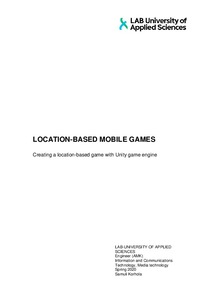Implementing multiplayer core features for GameMaker Studio 2 using Node.js : game area instances and simulation layer
Aaltonen, Eetu (2024)
Aaltonen, Eetu
2024
All rights reserved. This publication is copyrighted. You may download, display and print it for Your own personal use. Commercial use is prohibited.
Julkaisun pysyvä osoite on
https://urn.fi/URN:NBN:fi:amk-2024052013399
https://urn.fi/URN:NBN:fi:amk-2024052013399
Tiivistelmä
The objective of the thesis was to implement multiplayer core features for an existing game prototype developed on GameMaker Studio 2. The game prototype, which had a single-player mode, was targeted to support multiplayer and networking. Node.js offered a solid JavaScript runtime with technologies and modules that helped to design and build a network topology and a client-server integration to the current game prototype.
The project and development were executed by the author alone. The work utilized common project management conventions and methods, including game designing, software requirements specification, agile development, kanban boards like Trello, version control tools like Git, and continuous testing. The tools and languages used included GameMaker Studio 2 with GML, Node.js written in JavaScript and run on Visual Studio Code, a group of NPM third-party modules, and several popular free project management tools.
As a result of the thesis, an integration between GameMaker Studio 2 and Node.js server was achieved. The implementation utilized network elements and technologies such as UDP communication protocol, a hybrid server model, and a custom protocol layer. With added multiplayer mode support, the game prototype has the potential to scale and include more gameplay elements adapted to networking in future development. It was also proved that GameMaker Studio 2 has potential and tools for multiplayer development with the help of external technologies.
The project and development were executed by the author alone. The work utilized common project management conventions and methods, including game designing, software requirements specification, agile development, kanban boards like Trello, version control tools like Git, and continuous testing. The tools and languages used included GameMaker Studio 2 with GML, Node.js written in JavaScript and run on Visual Studio Code, a group of NPM third-party modules, and several popular free project management tools.
As a result of the thesis, an integration between GameMaker Studio 2 and Node.js server was achieved. The implementation utilized network elements and technologies such as UDP communication protocol, a hybrid server model, and a custom protocol layer. With added multiplayer mode support, the game prototype has the potential to scale and include more gameplay elements adapted to networking in future development. It was also proved that GameMaker Studio 2 has potential and tools for multiplayer development with the help of external technologies.
Kokoelmat
Samankaltainen aineisto
Näytetään aineisto, joilla on samankaltaisia nimekkeitä, tekijöitä tai asiasanoja.
-
Game Development in Unity : Game Production, Game Mechanics and the Effects of Gaming
Dansie, Jason (Metropolia Ammattikorkeakoulu, 2013)The goal of this thesis is to examine how video games are designed and to see how differ-ent game mechanics work and how to use them in the development of a game, as well as examine what are both the positive and negative ... -
Location-based mobile games : creating a location-based game with the Unity game engine
Korhola, Samuli (2020)The subject of this thesis is location-based mobile games. Location-based mobile games are a way for mobile games to combine reality with virtual worlds and thus re-define the gaming experience. This thesis presents ... -
”WE WANT A 3D GAME” : Customer expectations for the games company when buying a serious game
Sorppanen, Mikko (Oulun seudun ammattikorkeakoulu, 2012)All digital games are not used for entertainment. Some of them can also be used for non-entertainment purposes and these games are called serious games. This thesis is carried out in co-operation with one Finnish games ...



